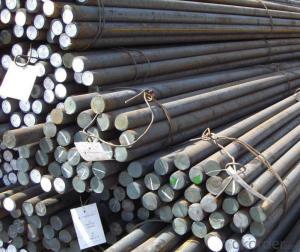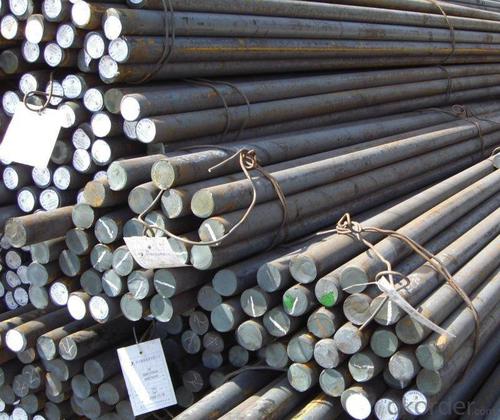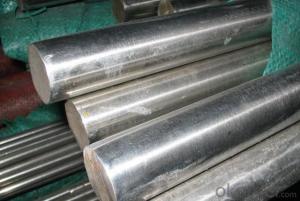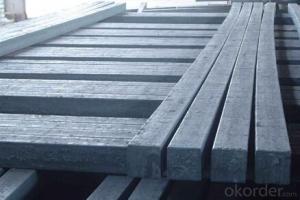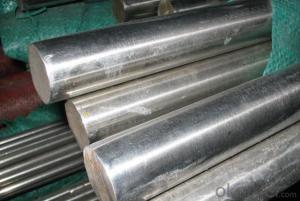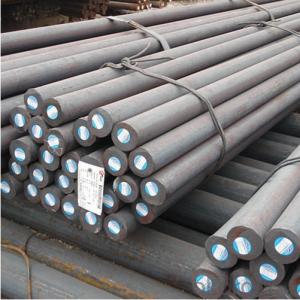50Mn Alloy Steel Round Bar of CNBM 16-300MM
- Loading Port:
- Shanghai
- Payment Terms:
- TT OR LC
- Min Order Qty:
- 25 m.t.
- Supply Capability:
- 50000 m.t./month
OKorder Service Pledge
OKorder Financial Service
You Might Also Like
Specification
Alloy round steel bar 50Mn
Product Description
1. Steel Grade: AISI 1045, 45#, C45, S45C
2. Diameter: 16mm-300mm
3. Length: 6m-12m
4. Shape: Round bar, flat bar, square bar
5. Technique: Hot rolled, cold drawn
Specification:
Material | 50Mn | Round bar | Dia(mm) | 16-600 |
Process | EAF + LF + VD + Forged + Heat Treatment (optional) | Length (mm) | Max 12000 | |
Heat treatment | Normalized / Annealed / Quenched / tempered | Flat bar | Thickness(mm) | 8-500 |
Delivery condition | Hot forged +Rough machined (black surface after Q/T)+ Turned (optional) | Width(mm) | 70-200 | |
Test | Ultrasonic test according to SEP 1921-84 D/d | Length (mm) | Max 12000 |
Chemical Composition
C | Si | Mn | Cr | Ni | Cu |
0.5~0.8 | 0.17~0.37 | 0.25~1.2 | ≤0.25 | ≤0.30 | ≤0.25 |
Packing and Delivery:
Packing in bundle package or as your requriements.
Delivery Detail: About 45 days after confirming order.
Usage and Applications
1. Steel round bar is used in a large number of architectural and engineering structures. Or it can be used in construction of plants for the production of steel house frames, high-voltage transmission towers, bridges, vehicles, boilers, containers, ships, etc.
2. And we can use this kind of product on the performance of the mechanical parts if the demand is not very high.
3. Some especial material steel round bar can be used for main shaft of steamer, hummer shank, with big section and supper force.
Product Show
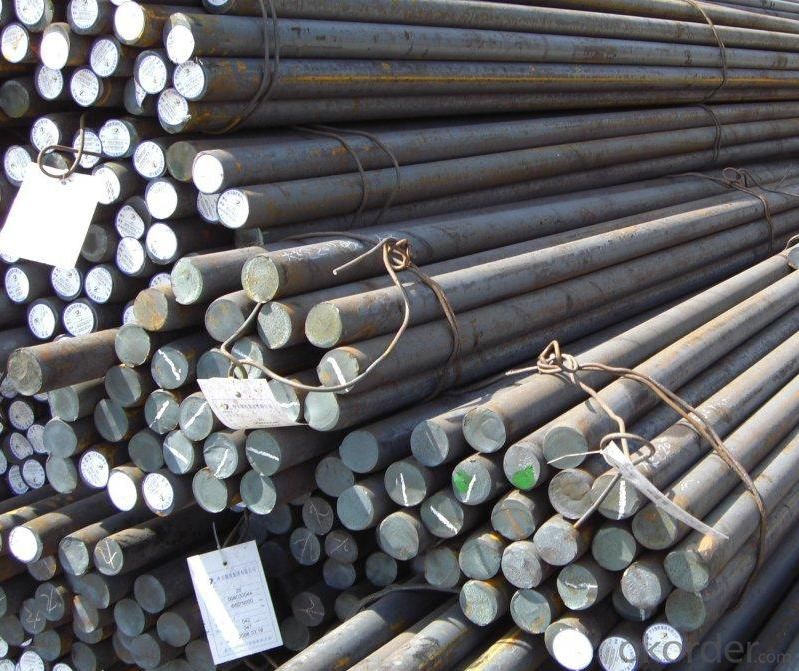
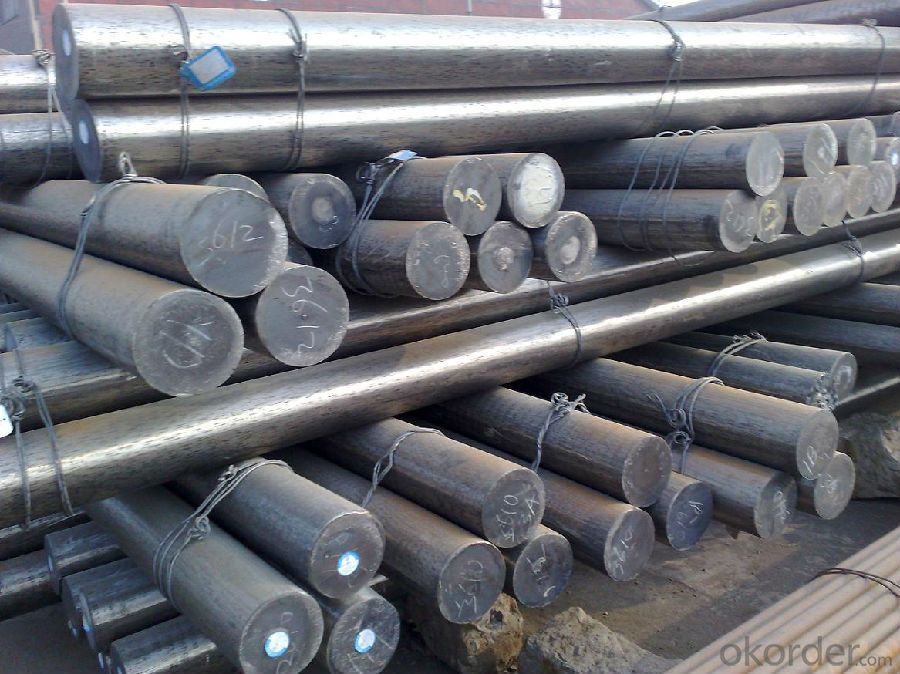
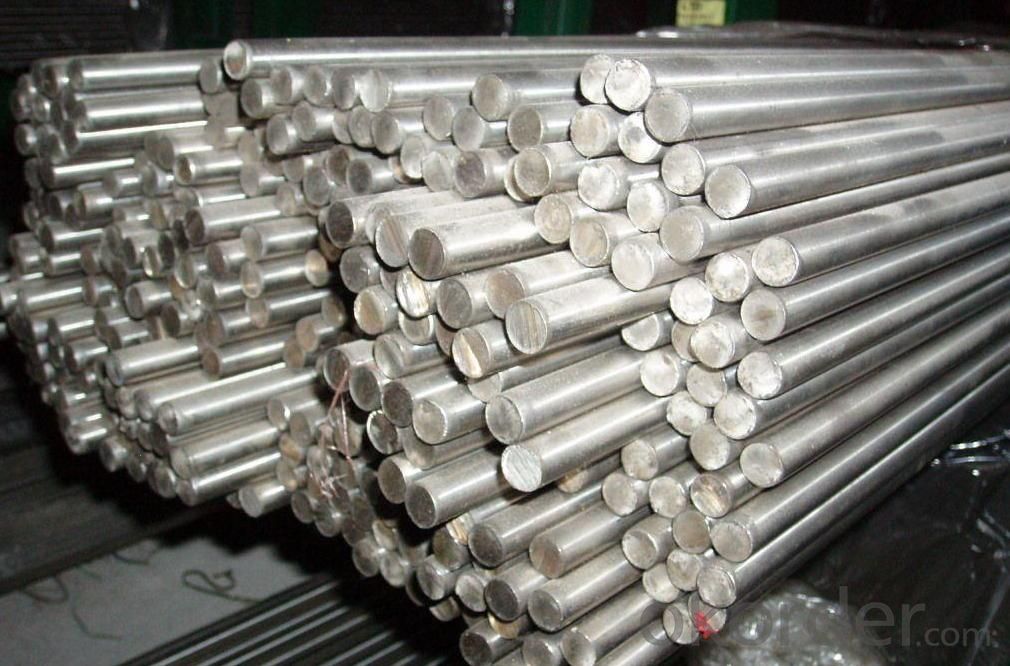
- Q: Can special steel be used in the semiconductor industry?
- Yes, special steel can be used in the semiconductor industry. Special steel alloys, such as stainless steel or high-temperature alloys, are often utilized for various components and equipment used in semiconductor manufacturing processes. These steels offer excellent corrosion resistance, high strength, and resistance to high temperatures, making them suitable for critical applications in the semiconductor industry.
- Q: How does special steel contribute to the flexibility of products?
- There are multiple ways in which special steel contributes to the flexibility of products. Firstly, its high strength and durability are well-known, enabling manufacturers to create products that can withstand heavy loads or extreme conditions. This allows for the production of flexible products suitable for various applications, ranging from automotive parts to construction materials. Furthermore, special steel possesses exceptional ductility and malleability, meaning it can be easily shaped, bent, or molded into different forms without compromising its structural integrity. This flexibility in design empowers manufacturers to produce products with intricate details and complex shapes, meeting specific customer demands or industry standards. Moreover, special steel's resistance to corrosion and wear guarantees that products made with this material have a longer lifespan and can endure harsh environments. This enhances the flexibility of products by minimizing the need for frequent replacements or repairs, ultimately saving time and costs for both manufacturers and end-users. Additionally, special steel's ability to maintain its mechanical properties at high temperatures makes it suitable for applications where thermal stability is vital. This enables the production of products that can function reliably in extreme heat or cold conditions, expanding their potential uses in industries such as aerospace, energy, or manufacturing. To summarize, special steel's high strength, ductility, corrosion resistance, and thermal stability all contribute to the flexibility of products. By providing a versatile and dependable material, special steel facilitates the production of products that can adapt to diverse requirements and environments, offering improved performance and longevity.
- Q: How does special steel perform in high-impact applications?
- Special steel is specifically designed to withstand high-impact applications. It has superior strength, toughness, and durability, allowing it to withstand extreme forces without deformation or failure. Its unique composition and manufacturing process make it highly resistant to fractures and cracks, making it ideal for applications where impact resistance is critical, such as in construction, automotive, and aerospace industries.
- Q: Can special steel be used in the construction equipment manufacturing industry?
- Yes, special steel can be used in the construction equipment manufacturing industry. Special steel, such as high-strength or wear-resistant steel, can provide enhanced durability and performance to construction equipment, making it suitable for demanding applications in the industry.
- Q: Can special steel be used in the renewable energy industry?
- Yes, special steel can be used in the renewable energy industry. Special steel, such as corrosion-resistant or high-strength steel, can be employed in various applications within the renewable energy sector. For instance, it can be used in the manufacturing of wind turbine components, solar panel frames, and hydroelectric infrastructure. The unique properties of special steel make it suitable for withstanding harsh environmental conditions and ensuring long-term durability and performance in renewable energy systems.
- Q: How does special steel contribute to reducing product weight while maintaining strength?
- Special steel contributes to reducing product weight while maintaining strength through its unique properties and composition. Special steel often has a higher strength-to-weight ratio compared to other materials, allowing manufacturers to use less steel without compromising on strength. Additionally, special steel can be engineered to have specific characteristics, such as high tensile strength or corrosion resistance, further enhancing its performance. By utilizing special steel, manufacturers can create lighter products without sacrificing durability, resulting in reduced weight and improved efficiency.
- Q: Can special steel be used in the automotive industry?
- Yes, special steel can be used in the automotive industry. Special steel alloys such as high-strength steel, stainless steel, and tool steel are utilized in various automotive components and structures to enhance durability, strength, and corrosion resistance. These steels are commonly used in areas such as chassis, body panels, engine components, and suspension systems, contributing to improved performance, safety, and fuel efficiency in vehicles.
- Q: How does special steel contribute to the corrosion resistance of products?
- By incorporating specific alloying elements, special steel enhances its ability to withstand corrosion and contributes to the corrosion resistance of products. These alloying elements, such as chromium and nickel, create a protective layer known as a passive film on the steel's surface. This passive film acts as a barrier, preventing the penetration of oxygen and moisture to the underlying metal, thus reducing the chances of corrosion. Special steel contains high levels of chromium, which enables the formation of a dense and stable chromium oxide layer on the surface. This layer acts as a physical barrier, preventing the diffusion of corrosive agents and inhibiting rust formation. Additionally, the presence of nickel in the alloy further improves the steel's corrosion resistance by promoting the formation of a more uniform and adherent passive film. Furthermore, special steel can undergo specific treatments or processes to enhance its corrosion resistance. Techniques like heat treatment and surface coating can modify the steel's structure and composition, facilitating the formation of more stable passive films and reducing susceptibility to corrosion. These treatments also improve the steel's mechanical properties, making it more durable and resistant to external factors that may lead to corrosion. In conclusion, the utilization of special steel in various products enhances their resistance to corrosion through the incorporation of alloying elements and the application of specific treatments that encourage the formation of protective passive films. This, in turn, extends the lifespan of the products and ensures their performance and integrity, even in harsh and corrosive environments.
- Q: Can special steel be used in the food packaging industry?
- Yes, special steel can be used in the food packaging industry. Special steel alloys, such as stainless steel, are commonly used in food packaging due to their corrosion resistance, durability, and ability to maintain product integrity. These properties make special steel suitable for applications where hygiene, safety, and longevity are essential, making it an ideal choice for various food packaging materials and equipment.
- Q: What are the specific requirements for special steel used in the oil and gas pipeline industry?
- The specific requirements for special steel used in the oil and gas pipeline industry are dictated by the harsh operating conditions and the need for high performance and reliability. Some of the key requirements include: 1. Corrosion resistance: Special steel used in the oil and gas pipeline industry must possess excellent resistance to corrosion, as pipelines are exposed to various corrosive elements such as moisture, gases, and chemicals. This helps to prevent the degradation or failure of the pipeline due to corrosion. 2. High strength: The steel used in pipelines must have high tensile strength to withstand the high pressure and stress that it experiences during transportation of oil and gas. This ensures the pipeline's structural integrity and prevents leaks or bursts. 3. Toughness and impact resistance: The steel must be able to absorb energy and resist fracture when subjected to sudden impact or external forces. This is crucial for maintaining pipeline integrity and preventing accidents or ruptures. 4. Low temperature toughness: As pipelines often operate in cold environments, the steel must exhibit excellent low-temperature toughness to prevent brittle fracture. This ensures that the pipeline remains ductile and resistant to failure even at extremely low temperatures. 5. Weldability: Special steel used in pipelines should be easily weldable to facilitate the construction and repair of pipelines. Good weldability ensures strong and reliable joints that can withstand the stress and pressure during operation. 6. Resistance to hydrogen-induced cracking: Steel used in the oil and gas pipeline industry should have high resistance to hydrogen-induced cracking (HIC) and sulfide stress cracking (SSC). These types of cracks can occur when hydrogen or sulfide ions penetrate the steel, leading to catastrophic failure. Resistance to these types of cracking is crucial for pipeline safety. 7. Compliance with industry standards: Special steel used in the oil and gas pipeline industry must meet specific industry standards and regulations. These standards ensure that the steel meets the required mechanical properties, chemical composition, and manufacturing processes necessary for safe and reliable pipeline operation. Overall, the specific requirements for special steel used in the oil and gas pipeline industry are aimed at ensuring corrosion resistance, high strength, toughness, low-temperature performance, weldability, resistance to cracking, and compliance with industry standards. These requirements are essential for maintaining the integrity and safety of oil and gas pipelines.
Send your message to us
50Mn Alloy Steel Round Bar of CNBM 16-300MM
- Loading Port:
- Shanghai
- Payment Terms:
- TT OR LC
- Min Order Qty:
- 25 m.t.
- Supply Capability:
- 50000 m.t./month
OKorder Service Pledge
OKorder Financial Service
Similar products
Hot products
Hot Searches
Related keywords
